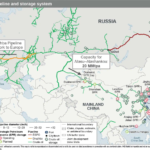Energy News Beat
ENB Pub Note: George McMillan III, ENB Contributor, and geopolitical energy expert, wrote this article. He was on an earlier podcast where we covered a fantastic global overview, and are tracking around the world in more detail. We are recording another podcast this week, and have several more articles in his series rolling out. Follow George on his LinkedIn page here, and reach out if you have any geopolitical energy questions. His analytical skills from the open sources and information are incredible. Our first podcast is HERE:
The West-to-East German-Russo-Japanese Pipeline Alliance
The possibility of the Alternative For Deutschland Party to defeat Olaf Scholz and the Social Democratic Party and repair Nordstream to purchase Russian Natural Gas is real along with the probability that they would immediately repair the Nordstream pipelines.
The Geopolitical Problem of the US—a German-Russo-Japanese Connection
The fundamental geopolitical problem of the United States boils down to preventing its two key allies, Germany and Japan, from purchasing cheaper Russian oil and natural gas. Delivered by pipeline, that cheap gas would make Germany’s and Japan’s heavy industries increasingly globally competitive. This would compel the secondary and tertiary industrial power centers in their regional orbit to follow suit, connecting to cheap Russian oil and natural gas in order to remain industrially competitive as well.
The reason why Germany is more important than Japan, is that the German World consists of Switzerland, Liechtenstein and Austria which shares a border with Germany on the Danube River. If the German oil and gas pipeline network is connected to Russia by any pipeline, then it could not only supply all of the German World, but the entire Danube River Slavic World as well.
Belgium, Netherlands and Luxembourg to the West would be sure to follow, as the Groningen gas field was scheduled to be shut down due to the ground tremors associated with natural gas extraction. The BENELUX countries have been connected to the German pipeline network for decades.
If Germany were to repair Nordstream, it is conceivable that more than a dozen countries could join a Russo-German natural gas market, paying directly in rubles and jettisoning the petrodollar. In this scenario, all the other countries in the German world could pay Germany in Euros and Germany could then pay Russia in rubles. The external drop in the demand for the US Dollar would likely internalize inflation inside the US.
Petrodollar Primacy and the Long March Towards Globalism
Should Germany exit the petrodollar financial system that supports the US’s burgeoning $34 trillion national debt, not only would that debt-support be in peril, but it would effectively end the NATO alliance as well. The purpose of NATO is to (a) keep the US in Europe, (b) keep Germany down in Europe and (c) keep the Soviet Union/Russia out of Europe. A Russo-German pipeline network reverses all of that proverbially overnight.
To emphasize: Gerhard Shroder’s Nordstream project implied, (1) a massive shifting of the global geopolitical alliances, (2) the nullification of NATO, and (3) the end of the petrodollar trading scheme—all in one fell swoop. As Seymour Hersh reported in February 2023, Nordstream was blown up.
The Russo-German natural gas pipeline alliance would have radically and rapidly shifted the global center of gravity from Washington and London to Berlin and Moscow. As the Wolfowitz Doctrine of 1992 revealed, power sharing is not part of the Paul Wolfowitz, Robert Kagan and Bill Krystol “US sole superpower” ideal in their long march towards globalism.
The more one understands how the Russian natural gas pipeline advantage works in conjunction with both the post-Mahan and post-Mackinder geopolitical theories as well as the post-Clausewitz and Bismark DIME (Diplomatic, Infrastructural, Military and Economic instrument of national power measures), the more people will understand why the US is feverishly trying to block all Russian and Chinese infrastructural projects around Eurasia, with Nordstream being the most important project to stop. Other than a few people in some of the world’s intelligence agencies, only a relative few university graduates are ever exposed to these relationships.
Understanding the US Counterstrategy—Radicalizing Mackinder
This form of geopolitical modeling makes it easier to understand US Foreign policy following the collapse of the Soviet Union: The US counterstrategy is simply to block all logistical supply routes emanating from Russia to as many coastal rimland industrial power centers in Eurasia as possible.
The US counter strategy to the Westward expansion of Soviet/Russian oil and natural gas to the West can be summed up in the three aspects: first, the immediate expansion of the European Economic Council (EEC) and European Union Eastward as a cover for action to expand the Office of Security Cooperation Europe (OSC-E) and NATO for the purpose of surrounding the pipelines emanating from Belarus; secondly, move the EU/NATO into Romania to regulate direct access of Russia to its Slavic allies in the Balkans via the Danube River Valley; and thirdly to move into Georgia to control the South Caucuses that lead to the Caspian Sea oil and natural gas reserves. By controlling Georgia and Armenia the US can control Azerbaijan’s ability to transit oil and gas via pipeline to the Black Sea and onward to Bulgaria by an undersea pipeline as outlined in Fiona Hill’s 2004 article published by Brooking Institution.
Interesting background is that Fiona Hill’s article was written under the direction of Robert Kagan of the Brookings Institute. The three-part plan to envelop Belarus and Russia to take control of all of the oil and natural gas pipelines was well known within certain circles including Robert Kagan, the husband of Victoria Nuland and brother of Frederick Kagan. Frederick Kagan taught at West Point and is married to Kimberely Kagan, who along with Bill Krystol reconstituted the Project for the New American Century (PNAC) into the Institute for the Study of War (ISW). The “ISW” employs retired Generals Jack Keen and David Petraeus. In one way or another, the Kagans, Bushes and Dick Cheney all have the Yale Grand Strategies courses in common.
General Wesley Clark’s 2007 presidential campaign platform was based on the idea that US Foreign policy was “hijacked” by a relative few. That few were pursuing regime-change/nation-building and regime-change/destabilization strategies not widely known let alone debated in any of the democratic processes. Since “journalists” were unaware of this aspect of International Relations and International Political Economy the media did not and does not discuss it.
Clark argued that the foreign policy decision path was never discussed in the open and was barely known outside of certain very small circles. The critique of retired General Clark’s campaign speeches is that he neither defined the geopolitical strategies nor did he ever enlarge the decision-making circle to get past the Democrat primaries. In the US democracy, it is time to make the geopolitical Grand Strategies known to the general population for democratic debate.
[end]
ENB #160 What is the United States afraid of? George McMillan, CEO of McMillian Associates, stopped by the Energy News Beat podcast. – UPDATE
ENB Top News
ENB
Energy Dashboard
ENB Podcast
ENB Substack
The post The Geopolitical Problem of the US—a German-Russo-Japanese Connection appeared first on Energy News Beat.








